Mary Anne Yarde's Blog: The Coffee Pot Book Club , page 102
February 26, 2020
#HistoricalFiction author, Deborah Swift, is sharing the inspiration behind her fabulous new book — The Occupation #Jersey #WW2 @swiftstory @SapereBooks

An Author’s InspirationBy Deborah Swift
During World War Two, the Channel Islands were the only part of the British Isles to be occupied by the Germans. Jersey is a tiny island, only eight miles long, so I was fascinated to find out how the population managed to keep up their morale, when as many as fifteen thousand (yes, you read that right) Germans had taken over the islands. What happened to the Jews on Jersey, or to the other groups that the Nazis considered ‘undesireable’? How did it feel to be invaded by a foreign army?
 German soldiers in St Helier]
German soldiers in St Helier]My story is about Celine who lives on the island of Jersey and is married to Siegfried, (who she calls Fred) a delightful German she met before the war in Vienna. Together they run a patisserie for the tourists and Fred bakes traditional Austrian pastries. Of course all that changes when war comes. Fred finds himself conscripted into the Wehrmacht, where he is posted to occupied France, and Celine is left at home on Jersey. So they are suddenly on different sides of the occupation. Fred’s story in ‘The Occupation’ is based on a number of accounts of life in the Germany army, and in the French Resistance. I was interested to examine the idea of occupation from the point of view of both the occupier, and the occupied. Fred begins his journey in occupied Paris, but ends up as a spy in Marseille, where he has some hard choices to make about which side he serves.
 Round up of Jews in Marseille.
Round up of Jews in Marseille.What always interests me in fiction is the conflicts that arise because of the circumstances of war, where one nation is pitted against another, and people who might have been amicable before the conflict are forced to swear allegiance to a sharp division between one side and another, when in reality, and in people, many different shades of grey exist.
The story of the occupation of the Channel Islands became much more interesting and involved the more I uncovered. And Jersey’s history site the Island Wiki is having more material added every day by people who remember the German occupation or have photographs or anecdotes to share. Nazi rule on the islands was supposed to be a ‘peaceful’ occupation. Of course, when you are invaded it might look peaceful, but underneath the tensions soon began to show. The oppressive Nazi force vastly outnumbered the British people left on the island. Those that remained had to find ways to resist, and ways to outwit the unwanted intruders in their traditional way of life.
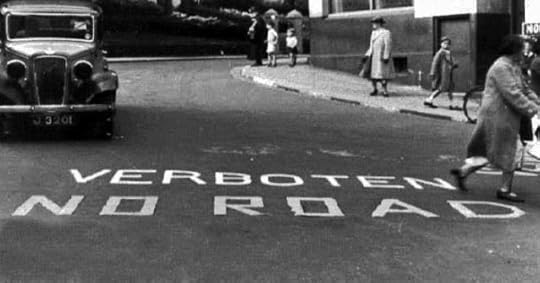 German Road Markings.
German Road Markings.German rule took over – people had to speak German, cars had to drive on the right, many things that had been allowed before, such as owning a car or a radio, were ‘verboten’ – forbidden. Meetings of more than three people were banned. Identity cards and ration cards were introduced and the Germans began a building programme to fortify the island, which they intended to use at a military base to attack England. Vast concrete fortifications were built by slave labour.
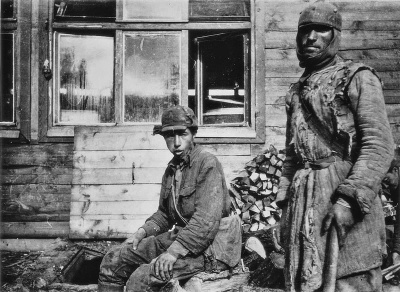 Russian slave workers on Jersey.
Russian slave workers on Jersey.My story is based on several true accounts, although I have welded them together and compressed them into a fictional narrative. Céline and Rachel’s story was inspired by the true Jersey story of Dorothea Weber, who hid her Jewish friend Hedwig Bercu from the Germans. More on this surprising real life story can be found hereFor an overview on the occupation of Jersey, the BBC history site
The OccupationBy Deborah Swift

One woman’s secret war against the Nazis. One man’s war against himself…
1940, Jersey
When Nazi forces occupy Jersey in the English Channel Islands, Céline Huber, who is married to a German, must decide where her loyalty lies. Love for her island, and fear for her Jewish friend Rachel, soon propel her into a dangerous double life.
Meanwhile, Céline’s husband Fred is conscripted into the Wehrmacht in occupied France. Horrified by Nazi acts of atrocity and torture, he soon becomes a double agent for the French Resistance. But when things go wrong, and his Nazi masters discover his true allegiance, he finds he has the whole of the German Army on his tail.
How far will Céline go for her best friend? Will Fred make his way home to her, or will their lives be changed forever by the brutality of war?
Pick up your copy ofThe OccupationAmazon
Deborah Swift
 Deborah Swift is the author of three previous historical novels for adults, The Lady’s Slipper, The Gilded Lily, and A Divided Inheritance, all published by Macmillan/St Martin’s Press, as well as the Highway Trilogy for teens (and anyone young at heart!). Her first novel was shortlisted for the Impress prize for new novelists.
Deborah Swift is the author of three previous historical novels for adults, The Lady’s Slipper, The Gilded Lily, and A Divided Inheritance, all published by Macmillan/St Martin’s Press, as well as the Highway Trilogy for teens (and anyone young at heart!). Her first novel was shortlisted for the Impress prize for new novelists.She lives on the edge of the beautiful and literary English Lake District – a place made famous by the poets Wordsworth and Coleridge.
Connect with Deborah: Website • Facebook • Twitter • Goodreads.
Published on February 26, 2020 19:00
February 25, 2020
#BookReview — Oath of Allegiance (Allegiance, Book 2) by Jana Petken #HistoricalFiction #WW1 #Ireland @AuthoJana
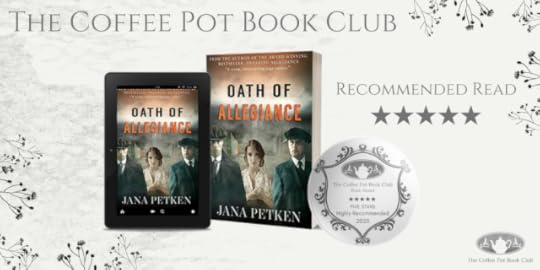
Oath of Allegiance(Allegiance, Book 2)By Jana Petken
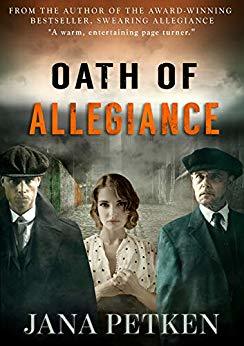
As the Great War enters its most deadly phase, Patrick, Jenny, and Danny Carmody must cast aside their personal desires in order to stand with Britain against Germany and her allies.
Danny, who is recovering from serious wounds, is devastated when he learns he must return to the Continent to fight at the front.
Patrick, traumatised by his experience on HMHS Britannic, prays for a shore posting, but the Royal Navy has something much more insidious in store for him.
Jenny and Kevin rekindle their love for one another but their relationship is tested when the Irish people demand their independence from Britain and its king. Jenny must choose between her brothers and her new husband’s Anglo-Irish aristocratic family.

"I promise you, my darlin', I'll not get involved in Ireland's troubles when I come home..."
That's if he came home. Danny Carmody had already cheated death once. He doubted he would do so again. Danny had thought his war over when he had been gassed at the Front, but no. Here he was back at the Somme, waiting for the orders that would send him over the top and towards certain death. And for what? To gain a few miles of land? It was a war governed by fools who sent lambs to the slaughter while expecting a result other than butchery.
Patrick Carmody had, unlike his brother, joined the Royal Navy. However, if Patrick never stepped on a boat again, it would be too soon. The White Star Line was cursed, or so it seemed. Patrick had survived the sinking of HMHS Britannic, but would he be so lucky a second time?
Jenny Carmody was at last married to the man she loved, and that was all that mattered. However, Kevin had not told Jenny the whole truth about who his family were. Jenny knew they were protestant and of standing, but there was so much more she did not know. So much more...
From the horrors of The Western Front to the disappointment of The Anglo-Irish Treaty of 1921, Oath of Allegiance: Allegiance, Book 2 by Jana Petken is the unforgettable story of the Carmody family, and how they survived one war but were very nearly torn apart by another.
Where do I even begin to attempt to express how wonderful this book is? I could speak of how Petken stimulated all five senses with her vivacious storytelling. I could praise Petken for her fabulous historical descriptions. I could celebrate Petken's novelist eyes for human failings — her emphatic understanding of the human condition. I could, of course, praise the narrative, which is as lucid as it is enthralling. Or, the prose that washed over me in riotous colours of green and white and orange. This is a book where the patriots become the terrorists. Where those who are meant to protect become a seedy colour of Black and Tan. Where life is torn asunder by a war that had been going on for years and would continue to go on for decades more. This is a story about the day the Emerald Isle began to drown in the blood of her own people. This is a story about the Irish Republican Army (IRA). This is the story of one family whose life would never be the same again.
The historical detailing of this book has to be commended. Petken has really nailed this era. Not only is Petken a talented author, she is also the most dedicated of historians. Petken's knowledge of what conditions were like at the Somme, to her understanding of the events that led up to Bloody Sunday and the Civil War in Ireland has to be commended. One does not just sit down and write a historical fiction book that is so incredibly authentic and as true to the history as can be without hours and hours of research. Petken is, without a doubt the creme de la creme of historical fiction writers. If you don't believe me, pick up this book.
Petken's depiction of The Battle of the Somme was vivid in all its desperate detail. We experience the brutalities of trench warfare through the eyes of Danny Carmody. The horror of learning that you were being sent back to where you had almost died is beyond comprehension. But when in Hell, Danny is pragmatic enough to keep walking. Danny endures so many unbearable events in this book, and he finds himself embroiled in a world that is dark and dangerous. He survives one world war, only to fight in a very different type of warfare when he finally makes his way home. Danny is a fabulous example of an anti-hero — as a reader, I sympathised with Danny so much, he is dealt one terrible blow after another, and he finds himself in an incredibly dark place. Danny's demons are always near him, and for some reason, he seems to believe that he has no right to happiness and peace. However, what he becomes, and the things that he does with such cold and calculated precision makes him something short of monstrous. His character reminded me greatly of Frankie McGuire, in Vincent Patrick's, David Aaron Cohen's, and Kevin Jarre's, The Devil's Own. Like Frankie, Danny is a really likeable character, and I feared for him throughout this book. I just wanted him to escape this dangerous cycle of violence that he can't seem to see his way out of, not that he wants to be out of it. Danny becomes a fanatic, but there is so much more to him than that. I thought Danny's portrayal was absolutely fabulous, and his narrative made Oath of Allegiance unputdownable. His depiction was brilliantly executed.
Patrick Carmody is the glue that holds this troubled family together. He is the one constant in everybody's life. But unbeknown to anyone, Patrick has his own demons. Demons, that if discovered, could end in imprisonment and, in a worst-case scenario, his execution. Patrick fights a different type of war to his brother, although like Danny's it is one shrouded in secrets and untruths. This book is set during a time where a person's sexual identity concerning the gender to which they were attracted to was, in some cases, illegal, and if discovered, your life was over. Not being able to hold hands with the person you loved, having to be always on guard must have been a dreadfully frightening burden. I thought Petken approached Patrick's character with a tenacious understanding of the time this book is set in. I wept for Patrick, I really did. Add to that Patrick's attempts to keep his family together when circumstance was tearing them apart, made him, for me, the hero of this story.
Jenny Jackson is a very strong heroine, who, like Patrick, has to fight for what she wants. She is a woman and therefore should, as society dictates, be ruled by her husband. The very idea that she wants access to her own money seems almost scandalous. Times were changing, but they were not changing that fast. Thankfully, Jenny married Kevin, who adores the ground she walks on. Unfortunately, with the onslaught of escalating troubles in Ireland, Jenny must make an impossible choice. Jenny is married into a wealthy and very influential protestant family. Her father-in-law is a member of the House of Lords and a British Loyalist. Jenny's brother-in-law is a detective at Dublin Castle, whereas Jenny's brother, Danny, becomes a known member of the IRA. This is a family where loyalties are fundamentally divided, but the deep love the Carmody siblings have for each other makes estrangement incredibly challenging. Jenny comes from a very loving and very loyal family, and the path that Danny chooses has devastating consequences for all of them. I adored Jenny, she is a wonderful heroine who will not be cowed by her husband’s aristocratic family, nor will she be used by Kevin's brother who is desperate to find out Danny's whereabouts. I thought her depiction was marvellous.
As one would expect, there are some historical figures in this book. One cannot write a book about the IRA in the early 20th century without mentioning Michael Collins. Petken presents her readers with a very charismatic man in Collins, but she also stuck very close to the documented history about him. Collins commands respect, and he does not tolerate disloyalty. I was intrigued by her depiction of Collins, and although he is only a secondary character in this book, Collins is of course, as he once was in life, controlling the narrative.
Petken portrays the IRA as a very violent organisation, but she also explains why these men thought such actions were necessary. Petken does not make them heroes but like with Danny's characterisation, she does try to provide a balanced view of who they were and what they were fighting for, which of course was an independent Ireland. The actions are at times utterly deplorable, but then so was the activities of the RIC which Petken also depicts in all its reprehensible behaviour.
Petken is a multi award-winning and international bestselling author, and I can understand why. All of her books are amazing, I am already a massive fan of Petken's work, but Oath of Allegiance completely blew me away. It is outstanding. This book deserves a place on your bookshelf, and if ever a book deserved to be the next big series on Netflix, then it is this one.
I Highly Recommend
Review by Mary Anne YardeThe Coffee Pot Book Club.
Pick up your copy ofOath of AllegianceAmazon UK • Amazon US
Jana Petken
 Jana Petken is a bestselling historical fiction novelist and screenwriter.
Jana Petken is a bestselling historical fiction novelist and screenwriter. She is critically acclaimed as a bestselling, gritty, author who produces bold, colourful characters and riveting storylines. She is the recipient of numerous major international awards for her works of historical fiction and is presently in talks with film producers regarding one of her titles.Before life as an author, she served in the British Royal Navy. During her service, she studied Naval Law and history. After the Navy, she worked for British Airways and turned to writing after an accident on board an aircraft forced her to retire prematurely.
Connect with Jana: Website • Twitter • Goodreads
Published on February 25, 2020 21:00
Join me in conversation with author, Cory B. Scott #interview #amwriting #memoir @CoryBScott1
Published on February 25, 2020 20:00
February 24, 2020
#BookReview — Siege (The First Crusade, Book One) by Richard Foreman #HistoricalFiction #Crusades @RForemanAuthor

Siege(The First Crusade, Book One)By Richard Foreman
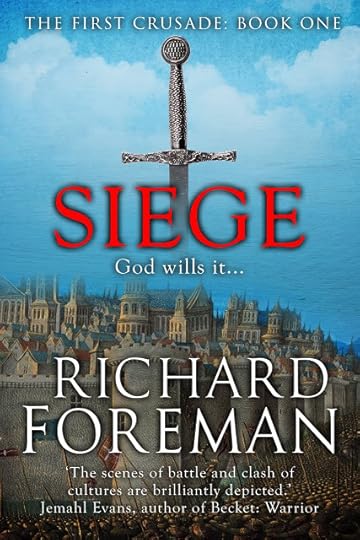
1098.The crusader army still stands outside Antioch. Starving. Deserting.An enemy force, led by Kerbogha of Mosul, is days away from relieving the walled city.Bohemond of Taranto calls upon the English knight, Edward Kemp, to meet with an agent, who is willing to provide the Norman prince with access to Antioch.But Bohemond is not alone in wishing to capture and lay claim to the prize. Edward must contend with enemies in his own camp.Should the knight's mission fail, then so may the entire campaign.Antioch must fall.
Siege is the first book in a new series, set during the First Crusade, by bestselling historical novelist Richard Foreman.

"The Army of God has turned into the army of God Help Us..."
It began with an inspirational speech. Pope Urban II called all of the Christians of Europe to reclaim the Holy Lands from the Muslims. "Deus vult," Urban had cried. "God wills it." Glory and riches, in this life, and the next, would be the reward to those brave enough to wrestle the Holy Sepulchre from the Saracens.
"Deus vult," he had cried. "Deus vult."
And so it seemed God had indeed willed it. Until the day His army looked upon the high fortified walls of the City of Antioch. It was then that His soldiers began to doubt the sincerity of Pope Urban II's words.
From a contest between Raymond's nephew and a knight of Bohemond's to the breaching of the walls of Antioch, Siege (The First Crusade, Book 1) by Richard Foreman is the most compelling historical fiction book I have ever read about the Crusades. Like a snapshot in time, Foreman has thrown his readers into the desperate situation facing the Crusaders as they came upon a colossal stumbling block in their bid to retake the Holy Lands.
With a narrative that is almost ornate in the telling and with an astoundingly ambitious, yet very successful, plot, Foreman has presented a book that lovers of great historical fiction can get very excited about. Not only is Siege vastly entertaining, but it is also next to impossible to put down. One more page became one more chapter. This is the kind of book that makes a reader forgo sleep to finish.
The scope of the historical detail in this book has to be commended. Foreman has captured not only the desperation of the soldiers as food becomes scarce and starvation sets in but also the political intricacy and rivalry of men such as Bohemond and Raymond. Foreman has, it seems, an intuitive understanding of what makes history worth reading.
The crusading army was meant to be one of unity, but all men are ambitious, especially when it comes to peer esteem and wealth. The rivalry and the ambitions of the nobles who took up the Cross have been wonderfully explored in this book. Foreman concentrates on two rival companies.The first company is led by Bohemond of Otranto, and the second, by Raymond of Toulouse. Foreman demonstrates this rivalry between Bohemond and Raymond with great skill and diligence. Both men want to best the other — they both want to be victorious, although whether that was for God's sake or their own is open to debate.
Bohemond is portrayed as a man who commands the respect of his men. Men such as Edward Kemp and Thomas Devin — the protagonists in this story. Bohemond is also a very shrewd politician, as well as a military leader. He comes across as a very intelligent, and very knowledgeable commander. It seems that Foreman has brought Bohemond back from the dead and has breathed new life into him.
Raymond of Toulouse, as history tells us, was a very religious man who wished to die with honour in the Holy Lands. He was also extremely ambitious, and he wanted to be remembered. Foreman has given his readers a man who is more determined to vanquish Bohemond than to defeat the actual enemy, which I thought was an interesting take on this man's character and it was one that certainly helped to drive the story forward.
The protagonists of this book are two very different, and yet very wonderful men. Edward Kempt is a man who has suffered much during his life. He isn't a religious man at all. He sees what happened to him as a child as God's fault — God did nothing to stop the atrocities, or his parents murder. Edward is of the same mind as the seriousness of this siege takes hold. Men are starving. Men are dying because there is not enough food. Whose fault could this be but God's? They are, after all, fighting His war. Throughout this book, Edward struggles with his relationship with God, which I thought was endlessly fascinating. Also, Edward isn't in this fight because he wants to liberate the Holy Lands — he wants to earn enough money so he can buy a cottage, retire, get married, and raise a family. When you think of the Crusades, you think of men fighting under the banner of God, but Foreman reminds us with his characterisation of Edward that there were men whose swords were hired — they were not fighting for God, they were fighting for money. I thought Edward's depiction was fabulous. I really enjoyed reading about him.
My favourite character in this book is, without a doubt, Thomas Devin. Thomas is a profoundly pious young man who Edward calls a Holy Fool, because of his endless charity. Thomas would willingly starve to death if he could help someone else to live. He is a lamb amongst ravenous wolves, and I did fear for his safety on more than one occasion. However, like all lambs, there is a thread of a lion inside of Thomas, which is waiting to burst free and show the world what kind of man he truly is. I adored everything about Thomas, he makes solemn promises not only to God, but to his fellow man, and he will not break those promises, no matter what. He is a man that is fit to bursting with integrity, and I think this is what made him particularly appealing. Siege, is a story of desperate men, and an equally frantic battle to take control of the city. Thomas is a breath of fresh air in a world torn asunder by war.
As with any campaign during this era, and indeed, right up to very modern warfare, it was common for the army to have followers, be that the wives of the men, or prostitutes hoping to make some money from soldiers so far away from home. Foreman has given us the latter in Emma. Emma's war is not like her lover, Edward's, and nor is it like Thomas'. But I think it was a genius move by Foreman to add Emma into this story of war and ambition, for his readers get to witness the Siege of Antioch from a completely different perspective of that of a soldier or a knight. Emma's position is precarious — if the Crusaders lose, then she could end up dead or perhaps worse, a slave. This insight, I thought made this book scrumptiously balanced and gave an excellent depiction of what life may have been like for those who followed the army.
Siege (The First Crusade, Book 1) by Richard Foreman is a monumental work of scholarship. This book is bold, brutal and brilliant. I cannot wait to read Book 2 of what promises to be an irresistible series.
I Highly Recommend.
Review by Mary Anne Yarde.The Coffee Pot Book Club.
Pick up your copy ofSiegeAmazon UK • Amazon US
Richard Foreman
Richard Foreman is the bestselling author of numerous historical series set during the Roman Republic and Roman Empire, including the Augustus Caesar books, Sword of Empire and Sword of Rome. He is also the author Warsaw, Raffles: The Complete Innings and Band of Brothers, a series charting the story of Henry V and the Agincourt campaign. Richard writes modern thrillers too, under the pseudonym of Thomas Waugh. He is a judge for the HWA Crowns and the founder of the London History Festival. He lives in London.
Connect with Richard: Sharpe Books • Twitter • Goodreads.
Published on February 24, 2020 21:00
Join me in A Conversation with #Dystopian #ScienceFiction author, Julia K. Poulet @juliakpoulet
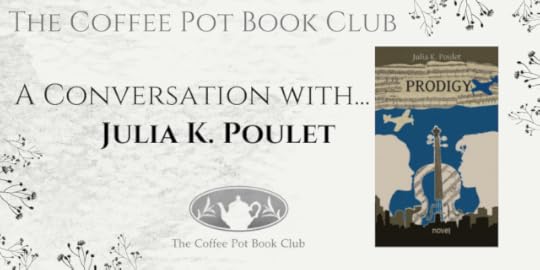
A Conversation with Dystopian Science Fiction author, Julia K. Poulet
 MA: Welcome to The Coffee Pot Book Club, Julia. Before we begin, could you please tell my readers a little about yourself?
MA: Welcome to The Coffee Pot Book Club, Julia. Before we begin, could you please tell my readers a little about yourself?JP: Hi. I am Julia. I am 31 years old and I have always written stories. I live in Germany but ever since I did my Master’s degree in Edinburgh, part of my heart has stayed in Scotland. I earn my money as a scientist but I enjoy building worlds and creating relatable characters in my free time. I play several instruments, love dancing and have become an avid rock climber and aerialist in the last few years.
MA: It is so lovely to meet you, Julia. Let’s crack on and talk about your new book, “Prodigy.” What inspired you to write “Prodigy”?
JP: A friend of mine, Josh, sent me a link to an article about a stolen violin. We both play the fiddle, so he knew this might be an interesting read for me. He never expected it to be the start of a book-idea. In the beginning, I thought about making it a contemporary detective novel, but with news coverage about climate change being omnipresent at the time, it ended up being a dystopian YA novel in the end. The music-aspect is quite important to the novel and this comes directly from my heart: I am absolutely convinced that music can save a life. I have used music as an emotional catalyst ever since I was in primary school and playing has a liberating and therapeutic effect on me.
MA: I know just what you mean about music. How did you come up with your setting and your characters?
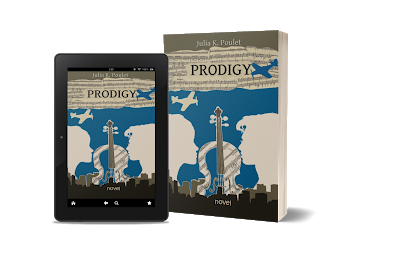 JP: “City 5”, where most of the plot is set, is loosely based on Berlin, what I imagine Berlin to look like in 250 years. I lived in Berlin for five years and never came to love the city, but it has great potential in a dystopian context.The story has two main characters with very different backgrounds. I find that Robyn is very similar to me in some aspects, especially in terms of how she perceives music. On the other hand, we have the “Oliver Twist” aspect of her: She lives in the underground and operates as a thief and she is independent, fierce and incredibly loyal to her found family. She definitely comes across as much older than she is, because circumstances forced her to grow up quickly.
JP: “City 5”, where most of the plot is set, is loosely based on Berlin, what I imagine Berlin to look like in 250 years. I lived in Berlin for five years and never came to love the city, but it has great potential in a dystopian context.The story has two main characters with very different backgrounds. I find that Robyn is very similar to me in some aspects, especially in terms of how she perceives music. On the other hand, we have the “Oliver Twist” aspect of her: She lives in the underground and operates as a thief and she is independent, fierce and incredibly loyal to her found family. She definitely comes across as much older than she is, because circumstances forced her to grow up quickly.Akira is the musical prodigy whose instrument Robyn steals. I read a few interviews with classical musicians who were pushed onto the stage very early on. I also have friends who were forced to learn an instrument as children and were pushed into practicing and for whom playing music is only a chore. I used these aspects to create Akira: She is extremely lonely and isolated in her position. She didn’t have a proper childhood, never got the opportunity to question her choices or to find her own way in life. On one hand, the violin and the music is all she knows, but on the other hand it’s her prison. When the violin is stolen, it’s the first opportunity for her to discover who she really is.
Your book sounds fantastic. There are many books in the dystopian sci-fi genre. Can you tell us three things that set your novel apart?
I find that very often, the technology and the people behind it are depicted as “bad”. This is definitely not the case with “Prodigy”. Other aspects of society are questionable and problematic, but the science is rather a good thing. “Prodigy” also doesn’t focus on the sci-fi aspect as much as on the characters’ journey. In a way it’s a coming-of-age drama. Finally, I don’t think I have seen music play a big role in Sci-Fi before. The music plays a crucial role in “Prodigy”, being a life-saver in more than one way. A substantial part of my research went into finding the right instrument for Akira to play. “The Lady Tennant” is an actual Stradivarius violin and it’s still in playing condition today.
MA: One last question, what are you currently working on?
JP: I am currently working on a light-hearted fantasy YA project. It’s set in the Scottish lowlands and has a brother and sister as main characters. It also has elves, leprechauns and ghosts. I put a lot of my love for music into “Prodigy” and I am putting a lot of my love for dancing into this new story.
MA: Thank you so much for taking time out of your day to chat with us today. If you like to learn more about Julia’s fabulous book, you know what to do. Scroll down!
IMAGES: I am going to send you an image of the book cover and I might also send you one of Akira which could go next to question 3 (I have commissioned one, but haven’t got it yet).
ProdigyBy Julia K. Poulet
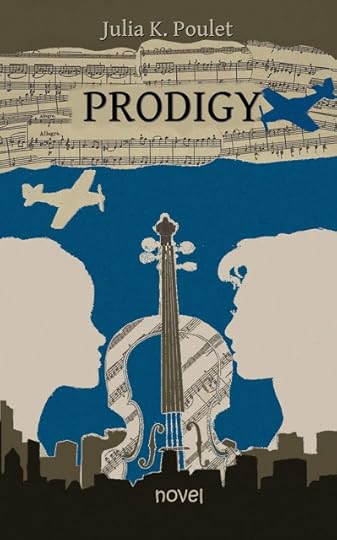
In the not-so-distant future where droughts and rainstorms are contant phenomena, most people live in the nameless cities of a globalized world. In the safety of the artificial atmosphere, housing and food is provided for everyone as long as they are productive members of the system. Those who don’t fit in end up on the streets in a parallel society with different rules.
When 17-year-old Robyn steals the priceless violin of young prodigy Akira Sato, she sets a series of events in motion that will change both girls’ lives fundamentally.
Pick up your copy ofProdigyAmazon • Barnes and Noble• Kobo
Julia K. Poulet
 Julia K. Poulet is a scientist, journalist, writer and multi-instrumentalist. She lives in Leipzig, Germany. “Prodigy” is her debut novel.
Julia K. Poulet is a scientist, journalist, writer and multi-instrumentalist. She lives in Leipzig, Germany. “Prodigy” is her debut novel.Connect with Julia: Website • Facebook • Twitter • Instagram. • GoodReads.
Published on February 24, 2020 20:00
February 23, 2020
Check out Jim Adameit's fabulous book — The Definition of Experience (Dan Gamble, Book 1) #mustread #Thriller @JimAdameit

The Definition of Experience (Dan Gamble, Book 1)By Jim Adameit

One Man’s Stand Against the Corporate Machine
An edgy, racy, action-packed business / financial / technology thriller, about the global industry that manufactures and brings us all our smart phones, laptop computers, cloud servers – and virtually any other electronic products you can think of.
Think this is boring stuff?
In a US$500 billion global market – with careers and that much money at stake?
Think again…
A primer on an industry that most people don’t know exists…A cautionary tale for those people who do…
Excerpt
Outside Stygian’s building at almost midnight, near the dumpsters around back, a group of mostly twenty-something-year-old Latino women wearing jeans, sneakers, sweatshirts, and dark blue smock-type aprons were all huddled around the largest dumpster there.
They were gathered together like they were watching a Mayan sacrifice ritual unfold. This particular dumpster held the contents of numerous wastebaskets emptied from back inside the plant, and was nearly full on one side.
One of the women, a bit older and thinner than the others and wearing long yellow latex gloves, noticed something. She reached inside and pulled out a shiny, black, rolled-up mass of fabric. It was a pair of woman’s panties, a black thong type with fancy lace around the waistband. She unrolled them slightly to look for the white tag, then adjusted the angle to catch some light from the dock’s spotlight to read it. The Rocky Mountain air was chilly, but no longer blowing snow.
The others now saw what she was holding and looked over, most walking over towards her. A few started to giggle when they saw what it was. They put their hands up to cover their mouths as their eyes widened.
“Mira, chicas”, the woman said as she grabbed opposite sides of the waistband while holding the panties outstretched, as if showing off a newborn baby. “XXL – para una mujer muy grande!”
Her hands gestured that these panties belonged to a big woman. It wasn’t every day that one of them found panties in a trash can. Large ones or otherwise. The lady with the yellow gloves starting giggling too, then broke into raucous laughter. She started twirling the panties high overhead like a New Year’s Eve noise-maker, and danced around in a circle. Others copied her antics, joining her in unison.
A few of them kept turning their heads around to make sure they weren’t being watched from the door by which they entered and exited the building, adjacent to the plant’s loading docks. They all needed a good laugh, and took advantage of the opportunity, but they didn’t want to get caught goofing off. Still, none of them knew when they’d have an opportunity or reason to laugh like this again, at work.
Emptying trash cans at Stygian Electronics Company wasn’t usually this entertaining.
Pick up your copy ofThe Definition of ExperienceAmazon UK • Amazon US • Smashwords
Jim Adameit
 Jim Adameit is the author of ‘The Definition of Experience’, his debut thriller novel in this series. Jim is a 30+ year seasoned veteran of the Contract Manufacturing / Electronic Manufacturing Services industry, in which he’s held various senior level global positions, including sales & marketing, contract administration, and project management.
Jim Adameit is the author of ‘The Definition of Experience’, his debut thriller novel in this series. Jim is a 30+ year seasoned veteran of the Contract Manufacturing / Electronic Manufacturing Services industry, in which he’s held various senior level global positions, including sales & marketing, contract administration, and project management. Connect with Jim: Website • Facebook • Twitter.
Published on February 23, 2020 20:00
February 20, 2020
#BookReview — God’s in the Garden by Cory B. Scott #memoir #ChristianInspiration @CoryBScott1
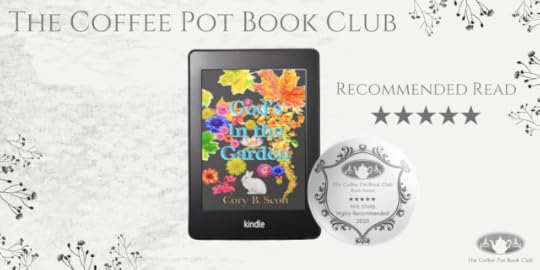
God’s in the GardenBy Cory B. Scott

An exhilarating memoir about one man’s journey through physical, emotional, and spiritual abuse to find his inspiring personal awakening.
Shaken by the loss of his mother, drained by his pursuit of a doctoral degree, and conflicted over his experience with illegal and unethical activities in religious organizations, Dr. Scott found himself questioning everything he had been raised to believe. This questioning sends him spiralling down a dark rabbit hole into a new world he never knew existed.
Through original artwork, creative writing, and rigorously honest introspection. Dr. Scott take us all on a journey into the dark places that separate us from unfiltered truth.

"Love is the truth, religion is the lie, the great misdirect. It takes the truth and molds it to self- serving principles, doctrines, and rules. They threaten you with hell as if a God made of love would allow his loved to burn."
There are many passages I could have taken from God is in the Garden by Cory B. Scott, but having spent my own childhood fearing I would somehow displease God because of my very human fallibilities, this is a passage that really struck a chord. How can a benevolent, omnipotent God, hang the torment of eternity in Hell, and yet still be called all-loving? It is a paradox and one that Scott explores in this frank, honest, and remarkable book.
Scott takes his readers on a very personal journey, where he explores his beginnings, and the abuse he endured by those who hid their true selves in the darkest shadows of institutional religion. Scott is unfailingly honest, which at times can make this book an emotional rollercoaster, and it did leave me in tears on more than one occasion. The doubts, the confusion that Scott talks about as he looks back on his life is a familiar story which most of us, unfortunately, would recognise. Scott does not shy away from who he is, and where he has been, and what he has done, which makes this book all the more hard-hitting. At the same time, however, Scott gives his readers hope. Hope that they too can find their way back to God and his Garden.
Scott's message is clear and concise, and easy to understand because of his use of stories, parables if you will. His story about a child at Sunday School whose curiosity and questions were squashed by an adult who was not qualified, as no one really is, to interpret how we should praise God was very moving. I think Scott made his point admirably when he stated:
"Truly I tell you, unless you change and become like little children, you will never enter the kingdom of heaven." With that in mind, maybe the children should be teaching Sunday school to the adults.
Would God really set his people up to fail? Scott asks. When you come away from the religious doctrine, then questions such as this one makes one pause and consider. However, as Scott stated, it is incredibly challenging to let go of the concepts and the "truths" that have been drummed into our minds so very early on in our lives, and not always done positively — especially when the threat of Hell is used to force obedience. No wonder the relationship many people have with God is corrupted, no wonder so many turn their backs on him — but what we forget, as Scott reminds us, is that God isn't the problem. Scott urges us to think for ourselves and to connect with God in our own way. Is it right for good people to fear that they will go to Hell because they have stumbled in life — made a mistake, made a wrong choice? How is this right? Scott says it is not. Another question that Scott asks is, can we only find God in the Bible? And then he reminds us that this book's contents were agreed upon not by God, but by the Council of Nicaea in AD 325. It is a sobering thought, indeed. Society has come along way since that first Council of Nicaea. Still, religion it seems has not kept pace as it drags its feet with regards to equality and tolerance, and let's not forget empathy.
Scott dares to argue that God cannot be all-loving and all-hating at the same time. Scott also dares to suggest that the Bible is not the word of God, it is written by man, and we must never forget that. Scott does not, however, dismiss God in a way shape or form, he is steadfast in his beliefs of this mighty celestial being, but what he questions is how religion is used as a tool to control minds and assure obedience. We are the sheep, and the shepherds (the religious leaders) are not really shepherds at all, and some of them are the wolves, or the serpent, sent to lead us away from God. There was, after all, only one Good Shephard — anything else is a poor and sometimes very dangerous imitation.
Some times self-help, self-enlightening books, can be rather dry and somewhat heavy in the delivery, but this is not so in Scott's book. What is also different about God's in the Garden, is that Scott does not pretend to have all the answers, but he wants his readers to awaken, to realise that there is a way back to the God they knew as a young child before religion got a hold of them.
Some who read this book will take offence at the arguments Scott puts forwards, which is totally understandable, and nothing can be done about their displeasure. But, if you read this book with an open mind, then you can take a lot away from it. This is the kind of book I wish I had read twenty years ago.
I Highly Recommend.
Review by Mary Anne Yarde.The Coffee Pot Book Club. <!-- /* Font Definitions */ @font-face {font-family:"Cambria Math"; panose-1:2 4 5 3 5 4 6 3 2 4; mso-font-charset:0; mso-generic-font-family:roman; mso-font-pitch:variable; mso-font-signature:-536870145 1107305727 0 0 415 0;} @font-face {font-family:Calibri; panose-1:2 15 5 2 2 2 4 3 2 4; mso-font-charset:0; mso-generic-font-family:swiss; mso-font-pitch:variable; mso-font-signature:-536859905 -1073732485 9 0 511 0;} /* Style Definitions */ p.MsoNormal, li.MsoNormal, div.MsoNormal {mso-style-unhide:no; mso-style-qformat:yes; mso-style-parent:""; margin:0cm; margin-bottom:.0001pt; mso-pagination:widow-orphan; font-size:12.0pt; font-family:"Calibri",sans-serif; mso-ascii-font-family:Calibri; mso-ascii-theme-font:minor-latin; mso-fareast-font-family:Calibri; mso-fareast-theme-font:minor-latin; mso-hansi-font-family:Calibri; mso-hansi-theme-font:minor-latin; mso-bidi-font-family:"Times New Roman"; mso-bidi-theme-font:minor-bidi; mso-fareast-language:EN-US;} p {mso-style-noshow:yes; mso-style-priority:99; mso-margin-top-alt:auto; margin-right:0cm; mso-margin-bottom-alt:auto; margin-left:0cm; mso-pagination:widow-orphan; font-size:12.0pt; font-family:"Times New Roman",serif; mso-fareast-font-family:"Times New Roman";} .MsoChpDefault {mso-style-type:export-only; mso-default-props:yes; font-family:"Calibri",sans-serif; mso-ascii-font-family:Calibri; mso-ascii-theme-font:minor-latin; mso-fareast-font-family:Calibri; mso-fareast-theme-font:minor-latin; mso-hansi-font-family:Calibri; mso-hansi-theme-font:minor-latin; mso-bidi-font-family:"Times New Roman"; mso-bidi-theme-font:minor-bidi; mso-fareast-language:EN-US;} @page WordSection1 {size:595.0pt 842.0pt; margin:72.0pt 72.0pt 72.0pt 72.0pt; mso-header-margin:35.4pt; mso-footer-margin:35.4pt; mso-paper-source:0;} div.WordSection1 {page:WordSection1;} </style></span></div><br /><span style="color: black; font-family: "times" , "times new roman" , serif; font-size: 16pt;"><br /></span><span style="color: black; font-family: "times" , "times new roman" , serif; font-size: 16pt;"><br /></span><br /><div class="MsoNormal" style="line-height: 21pt;"><span style="font-family: "times" , "times new roman" , serif;"><br /></span></div><div align="center" class="MsoNormal" style="line-height: 24px; text-align: center;"><span style="font-size: 35pt; line-height: 70px;"><span style="color: #666666; font-family: "times" , "times new roman" , serif;">Pick up your copy of<o:p></o:p></span></span></div><div align="center" class="MsoNormal" style="line-height: 24px; text-align: center;"><i><span style="font-size: 35pt; line-height: 70px;"><span style="color: #666666; font-family: "times" , "times new roman" , serif;">God’s in the Garden<o:p></o:p></span></span></i></div><div align="center" class="MsoNormal" style="line-height: 24px; text-align: center;"><span style="font-size: 35pt; line-height: 70px;"><span style="color: #666666; font-family: "times" , "times new roman" , serif;"><a href="https://www.amazon.com/dp/B081D9M17V&... class="MsoNormal" style="line-height: 21pt;"><span style="font-family: "times" , "times new roman" , serif;"><br /></span></div><div class="MsoNormal" style="line-height: 21pt;"><span style="font-family: "times" , "times new roman" , serif;"><br /></span></div><div class="MsoNormal" style="mso-line-height-alt: 21.0pt;"><span lang="EN-US" style="font-family: "times" , "times new roman" , serif; font-size: 35pt;"><span style="color: #666666;">Cory B. Scott</span><o:p></o:p></span></div><div class="MsoNormal" style="line-height: 21pt;"><span style="font-family: "times" , "times new roman" , serif;"><br /></span></div><div class="separator" style="clear: both; text-align: center;"><a href="https://1.bp.blogspot.com/-kMeyUFTinS..." imageanchor="1" style="clear: left; float: left; margin-bottom: 1em; margin-right: 1em;"><span style="font-family: "times" , "times new roman" , serif;"><img border="0" data-original-height="1600" data-original-width="1287" height="320" src="https://1.bp.blogspot.com/-kMeyUFTinS..." width="257" /></span></a></div><div class="MsoNormal" style="line-height: 21pt;"><span lang="EN-US" style="color: black; font-family: "times" , "times new roman" , serif; font-size: 16pt;">Dr. Cory B. Scott has had an adventurous career that has afforded him the honor of such titles as, Doctor, Deputy, Lieutenant, Director, Executive, Reverend, and finally, his true passion, Professor. But those were just titles; He is really just, Daddy, Husband, Brother, Friend, Uncle, Mentor, writer, and finally, in 2019, he was awarded his true love, Grandpa. Cory has survived some devastating and tragic events along his path as well as some personal failures. These experiences have given him deep insight and a desire to help others overcome personal obstacles and transform their tragedies into strength and hope.<br /><br />Cory weaves original artwork, poetry, and stories in an incredible memoir titled, "God's in the Garden." This book captures the essence of a survivor's journey through abuse, pain, loss, betrayal, and enlightenment. Cory is the author of the "Inspiring, Metaphoric, and Psychedelic Stories of Oopy Loopy Provenance." A series of stand-alone stories set in the murky provenances of the heart and the human condition. These adventures explore the depths of our humanity. These crafty works are designed to inspire and help the reader use the power of metaphor to identify and overcome common hang-ups that hold us back from enjoying this life and reaching our full potential.<o:p></o:p></span></div><div class="MsoNormal" style="line-height: 21pt;"><span style="font-family: "times" , "times new roman" , serif;"><br /></span></div><div align="center" class="MsoNormal" style="line-height: 21pt; text-align: center;"><span style="color: black; font-family: "times" , "times new roman" , serif; font-size: 16pt;">Connect with Cory: <a href="https://authorcorybscott.com/"&g... • <a href="https://twitter.com/CoryBScott1"... class="MsoNormal"><span style="font-family: "times" , "times new roman" , serif;"><br /></span></div><span style="font-family: "times" , "times new roman" , serif;"><br /></span><br /><br /><br /><br /><br /><br />
Published on February 20, 2020 20:00
February 19, 2020
#BookReview — Heir to a Prophecy by Mercedes Rochelle #HistoricalFiction #Macbeth @authorrochelle
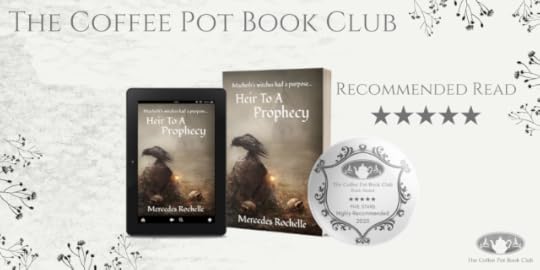
Heir to a ProphecyBy Mercedes Rochelle
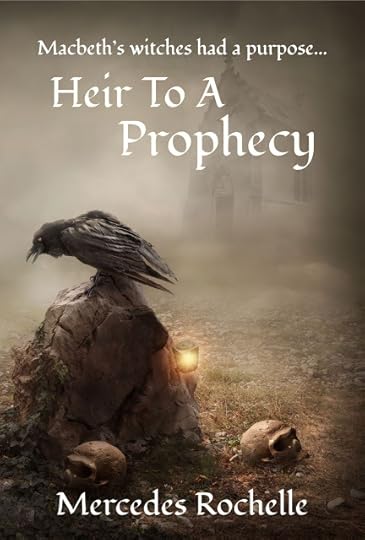
Shakespeare's Witches tell Banquo, "Thou Shalt 'Get Kings Though Thou Be None". Though Banquo is murdered, his son Fleance gets away. What happened to Fleance? What Kings?
The road to kingship had a most inauspicious beginning, and we follow Fleance into exile and death, passing the Witches' prophecy to his son Walter. Born on the wrong side of the blanket and raised in disgrace, Walter was caught inside of a destiny he barely understood. In an effort to untangle Banquo's murder and honor his lineage, Walter moved through events that shaped the course of England and Scotland. His relationships with the great men of his time drove his destiny: Harold Godwineson, Alain of Brittany and finally Malcolm III. After a long and treacherous journey through Wales, England, and France, Walter fulfilled the witches’ prophecy as the first Steward of Scotland and ancestor of James I—for whom Shakespeare wrote Macbeth.

"I've come to help avenge Banquo's death."Malcolm smiled sadly. "Then you shall not leave my side until it is done."
Walter knew nothing of his ancestry, only that he was illegitimate and his grandfather, Gruffydd ap Llewelyn, had cast out his daughter, Walter's mother, Nesta, and murdered Fleance, Walter's father. Walter knew nothing of his father's past until he was visited by three mysterious old women, who spoke of prophecy and destinies and other such dangerous things.
Walter has two choices. He could ignore the old hags and live the life he wanted. Or, he could take heed of their warning and follow the path they laid out before him and become The First Stuart of Scotland.
From a desperate escape from assassins to the crowning of the rightful King of Scotland, Heir to a Prophecy by Mercedes Rochelle is the utterly compelling story of how Banquo's grandson paved the way for a generation of kings.
Those who have read Shakespeare's infamous Scottish play will be familiar with brave and valiant Banquo, who like Macbeth failed to understand the cost of the weird women's prophecy, nor was he prepared for the ugly realisation that if he were indeed the father of kings then Macbeth, his dearest friend, would become a dagger hidden in the shadows of the night. *"Fly, good Fleance, fly, fly, fly," Banquo cried if you recall, for the instruments of darkness so often tell the truth, and thus Banquo dies. Rochelle has picked up the story from that remarkable play and has taken her readers with good Fleance as he flees for his life. But how did Banquo's son go on to father the Stuart dynasty? In this remarkable work of Historical Fiction, Rochelle has presented her readers with a plausible answer but without losing the essence, the superstition and the mythical element that is so prevalent in Shakespeare's Macbeth. Rochelle has stuck with tradition and allowed the Three Witches to control the narrative and, of course, toy with the protagonists. By doing this, Rochelle has not only captured the very essence of Shakespeare's play, but she has given us a story that is rich and vibrant and utterly compelling from start to finish. Heir to a Prophecy is the type of book that one will forego sleep to finish, and it is also one that would be next to impossible to forget.
Although Heir to a Prophecy opens with Banquo's death and Fleance's subsequent flight to Wales, it is Fleance's son, Walter, whose story this really is. Born a bastard, Walter is on first encounter, seemingly inconsequential. He comes from nothing. He is nobody. His mother, Princess Nesta, daughter of Gruffydd ap Llewelyn, had been thrown unceremoniously from Court and has been disowned by her family because of her love affair with Fleance. With a tremendous strength of spirit and a dogged determined to battle on, Nesta makes the best of a bad situation. I adored Nesta. She has such capacity for love and is yet used so cruelly by her father. His disappointment, his anger, leaves no room for reason. Lost and alone, without her lover, Nesta is determined to bring up her child the best way she can. How can you not admire such a character for that?
Walter is a troubled youth. He knows nothing of his father's heritage until the night he encounters the same three women who had visited his grandfather and King Macbeth in a heath near Forres. Unlike, Macbeth, Walter does not want to hear the weird women's prophecy, nor does he want to heed it, although he has sense enough to fear it. We, lucky readers, witness Walter's struggle with who he is and what he has seen. We watch him become a temperamental youth to a knight of honour. We follow him in battle and love. We watch him become the man he was destined to be. I thought Rochelle really nailed Walter's characterisation. He isn't this elevated man of goodness who his grandfather is portrayed as being. Walter makes terrible mistakes and conscientious decisions which have consequences — consequences that he is willing to answer. Walter is an incredibly complex character who has many layers which makes him endlessly fascinating. He is a fantastic protagonist who drives this story forward. It was an absolute pleasure, nay privilege, to read his story.
As one would expect from this time, there are, along with Walter, a host of historical characters. From Malcolm III Canmore: King of Scotland to the bastard Norman, William the Conqueror. All of these historical characters bring something unique to the narrative. Malcolm was a character who I liked very much, whereas William — he certainly knew how to plan a battle. Rochelle pens historical figures such as Harold Godwinson with an elegant sweep of her quill. Rochelle has breathed life into this vast cast of historical figures, and she has portrayed them in a remarkably realistic way — paying close attention, of course, to the historical sources from this time. I thought the portrayal of all the characters I encountered in this novel was brilliantly executed.
The historical scope of this book is vast. This was a time of warriors and kings, where the fate of a nation was decided upon a battlefield, as was petty grievances. Heir to a Prophecy is at times incredibly violent as war plays out between the pages. When it comes to battle scenes they can either make or break a book — Rochelle has captured the desperation, the fear, the sights, the smells, the abject terror and the anticlimactic relief when it was all over. The battle scenes are brilliantly portrayed in this novel. Rochelle has painted a very vivid picture of war and what it was like during the 11th Century. Kudos Ms Rochelle. Kudos indeed.
With a nod to Shakespeare, and with a keen sense of the era and the people that dominated it, Rochelle has presented her readers with a book that is immensely readable and thoroughly entertaining. Reading Heir to a Prophecy is like taking a spontaneous trip through time to a dark and dangerous past where heroes were born, and legends were made.
If you are looking for your next great Historical Fiction read, then look no further than Heir to a Prophecy by Mercedes Rochelle, for within the pages of this book you will witness exiled friends fight for the right to return home. And you will stand shoulder to shoulder, and you will finally cry *"Hail, King of Scotland!"
I Highly Recommend.
Review by Mary Anne Yarde.The Coffee Pot Book Club.
* Shakespeare,William — Macbeth Act 3, Scene 3 (Wordsworth Limited Edition 1996)* Shakespare, William — Macbeth Act 5, Scene 8 (Wordsworth Limited Edition 1996)
Pick up your copy ofHeir to a ProphecyAmazon UK • Amazon US
Mercedes Rochelle
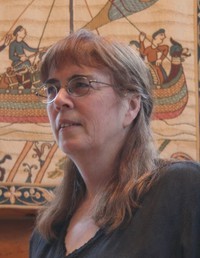 Born in St. Louis MO with a degree from University of Missouri, Mercedes Rochelle learned about living history as a re-enactor and has been enamored with historical fiction ever since. A move to New York to do research and two careers ensued, but writing fiction remains her primary vocation. She lives in Sergeantsville, NJ with her husband in a log home they had built themselves.
Born in St. Louis MO with a degree from University of Missouri, Mercedes Rochelle learned about living history as a re-enactor and has been enamored with historical fiction ever since. A move to New York to do research and two careers ensued, but writing fiction remains her primary vocation. She lives in Sergeantsville, NJ with her husband in a log home they had built themselves.Connect with Mercedes: Website • Blog • Facebook • Twitter
Published on February 19, 2020 20:30
Join #HistoricalFiction author, Douglas A. Burton, as he takes a look at Empress Theodora and the Origin of Women’s Rights @douglasaburton
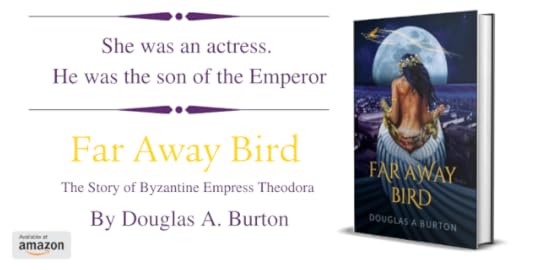
Empress Theodora and the Origin of Women’s RightsBy Douglas A. Burton
There are many currents that flow into the story of women’s rights. Many cultures are recognized for their egalitarian traditions and we have countless examples of great women in power—from the pharaoh Hatsheput to Queen Victoria to Eleanor Roosevelt. But one woman—Empress Theodora— achieved such a decisive victory for women in her time that her relative obscurity is breathtaking. More than fifteen hundred years ago, Theodora helped influence massive legal reforms aimed at improving the plight of women. During her reign, she influenced parts of a legal codex known as the Corpus Juris Civilis, which included a wave of specific rights for women. Historians credit this body of Roman law as central source material to the legal tradition of Western civilization. Whoa. Therefore, Theodora made direct contributions to a legal system that survived into the American Constitution, English common law, and even international public law. It’s rare to see such lofty legalism in the early Medieval era, but rarer still to know the individual woman behind the campaign. But who the hell is she? What laws did Empress Theodora change? And how could such an influential woman be forgotten?
“Therefore, Theodora made direct contributions to a legal system that survived into the American Constitution, English common law, and even international public law.”
Abandoned by most Western thinkers throughout the centuries, Empress Theodora came off as a salacious novelty, a Medieval prostitute-stripper who made it to the top through a lucky marriage. The scandalous gossip
 The Empress Theodora at the Colosseum, oil painting by Jean-Joseph Benjamin-Constant: Wikipedia.Theodora also saw to it that women could own and inherit propertyUnlike today, professional outlets for women were severely restrictive. Besides the socially acceptable “work-from-home-and-raise-a-family” jobs, such as weaving, innkeeping, or baking, the very concept of ‘professional women’ as a large and recognizable class did not exist with one exception. A large number of women worked in theaters and brothels. So, although this professional class of women carried a huge social stigma, their industry was one of the few places where women worked publicly outside the traditional family structure and earned real income. Therefore, laws that addressed legal matters for this lowly and socially powerless group is bold and unashamedly supportive of women in general. Theodora meant to treat the professional women of her society, sex workers though they may be, asprofessionals. She understood that these prostitutes, actresses, mimes, and singers earned money and could technically sustain themselves independently. But brothel keepers had legal authority over these women. So, Theodora shifted that legal authority back to women.
The Empress Theodora at the Colosseum, oil painting by Jean-Joseph Benjamin-Constant: Wikipedia.Theodora also saw to it that women could own and inherit propertyUnlike today, professional outlets for women were severely restrictive. Besides the socially acceptable “work-from-home-and-raise-a-family” jobs, such as weaving, innkeeping, or baking, the very concept of ‘professional women’ as a large and recognizable class did not exist with one exception. A large number of women worked in theaters and brothels. So, although this professional class of women carried a huge social stigma, their industry was one of the few places where women worked publicly outside the traditional family structure and earned real income. Therefore, laws that addressed legal matters for this lowly and socially powerless group is bold and unashamedly supportive of women in general. Theodora meant to treat the professional women of her society, sex workers though they may be, asprofessionals. She understood that these prostitutes, actresses, mimes, and singers earned money and could technically sustain themselves independently. But brothel keepers had legal authority over these women. So, Theodora shifted that legal authority back to women. “These reforms should be regarded as revolutionary since they shattered the most powerful class barriers.”
Under the new laws, no woman could be forced into prostitution“Therefore, when Theodora helped to facilitate the removal of the marriage ban, she did so without the support of either the secular or religious tradition.”
Once, Theodora arranged a marriage between one of her theater friends (an ex-prostitute) and a nobleman named Saturnitus
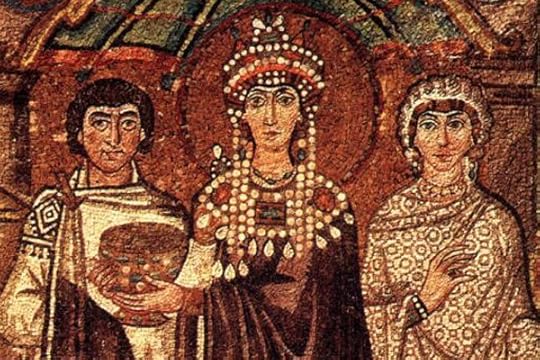 Mosaic of Theodora: Wikipedia.
Mosaic of Theodora: Wikipedia.Finally, in what I regard as a remarkable example of Theodora’s scope, sympathies, and real-world knowledge, she even dared to protect criminal women. In the Sixth Century, protection for male criminals wasn’t even a concern. That’s why I regard Theodora’s intervention on behalf of criminal women to be truly groundbreaking. If a woman required prison time, the new laws forbade her imprisonment in common jails where she had no protection from male guards who could abuse these women without recourse. She saw to it that criminal women were removed from common prisons and detained in a nunnery (that she constructed), under the supervision of other women. Empress Theodora was known to hold court in her opulent imperial bedchamber. There, surrounded by a retinue of her most trusted women and eunuchs, she ruled over what has been described as an almost “parallel government“The scene in Theodora’s bedchambers must have mirrored the impressive throne room of the Byzantine Empire, just a few hundred feet away.”
Theodora’s mark on history is a powerful, immovable example for us. The body of laws that came into being during her reign is known as the Corpus Juris Civilis and, according to Wikipedia: “The Corpus continues to have a major influence on public international law. Its four parts thus constitute the foundation documents of the Western legal tradition
Far Away Bird
By Douglas A. Burton
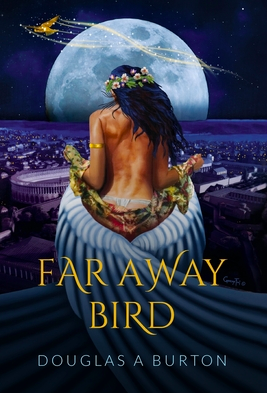
Inspired by true events, Far Away Bird delves into the complex mind of Byzantine Empress Theodora. This intimate account deftly follows her rise from actress-prostitute in Constantinople's red-light district to the throne of the Byzantine Empire.
Her salacious past has left historians blushing and uncomfortable. Tales of her shamelessness have survived for centuries, and yet her accomplishments as an empress are unparalleled. Theodora goes on to influence sweeping reforms that result in some of the first ever Western laws granting women freedom and protection. More than a millennium before the women's rights movement, Theodora, alone, took on the world's greatest superpower and succeeded. Far Away Bird goes where history classrooms fear to tread in hopes that Theodora can finally take her seat among the greatest women in history.
Theodora seems impossible--yet her transcendence teaches us that society can't tell us who we are deep down. Before there was a legendary empress, there was a conflicted young woman from the lower classes.
And her name was Theodora.
The Coffee Pot Book Club
★★★★★
Highly Recommended
Read the full review HERE!

The Historical Fiction Book of the Year
2019
The Early Medieval Period
Gold Medal
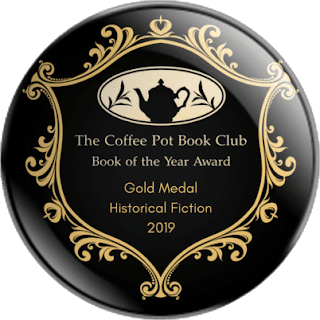
Debut Novel Book of the Year 2019
Silver Medal
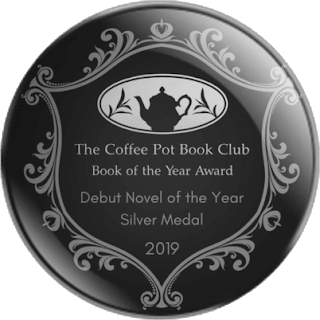
Pick up your copy of Far Away BirdAmazon UK • Amazon US
Douglas A. Burton
 Douglas Alan Burton is a speaker, author, and expert storyteller whose work depicts heroic figures and their deeper connection to the human experience. Doug blogs about heroes, heroines, and villains in pop culture with some unexpected and refreshing perspective. He grew up in what he describes as “the heroic boyhood culture of late Generation X” that has gone mainstream around the world. He also shares strategies with fellow writers for writing compelling heroic characters in fiction.
Douglas Alan Burton is a speaker, author, and expert storyteller whose work depicts heroic figures and their deeper connection to the human experience. Doug blogs about heroes, heroines, and villains in pop culture with some unexpected and refreshing perspective. He grew up in what he describes as “the heroic boyhood culture of late Generation X” that has gone mainstream around the world. He also shares strategies with fellow writers for writing compelling heroic characters in fiction.Douglas recently began outlining a breakthrough storytelling model that reveals a fascinating “heroine-centric” model for story structure he calls The Heroine’s Labyrinth. He believes a powerful new archetype is emerging for women in fiction. His forthcoming novel, Far Away Bird, which centers on the early life of Byzantine Empress Theodora, won the 2019 Manuscript Content for Historical Fiction from the Writers’ League of Texas.
Connect with Douglas: Website • Blog • Twitter.
References:
Published on February 19, 2020 20:00
Join me in Conversation with #HistoricalFiction author, Deborah Swift #interview #WW2 @swiftstory @SapereBooks
Published on February 19, 2020 19:30
The Coffee Pot Book Club
The Coffee Pot Book Club (formally Myths, Legends, Books, and Coffee Pots) was founded in 2015. Our goal was to create a platform that would help Historical Fiction, Historical Romance and Historical
The Coffee Pot Book Club (formally Myths, Legends, Books, and Coffee Pots) was founded in 2015. Our goal was to create a platform that would help Historical Fiction, Historical Romance and Historical Fantasy authors promote their books and find that sometimes elusive audience. The Coffee Pot Book Club soon became the place for readers to meet new authors (both traditionally published and independently) and discover their fabulous books.
...more
...more
- Mary Anne Yarde's profile
- 159 followers



